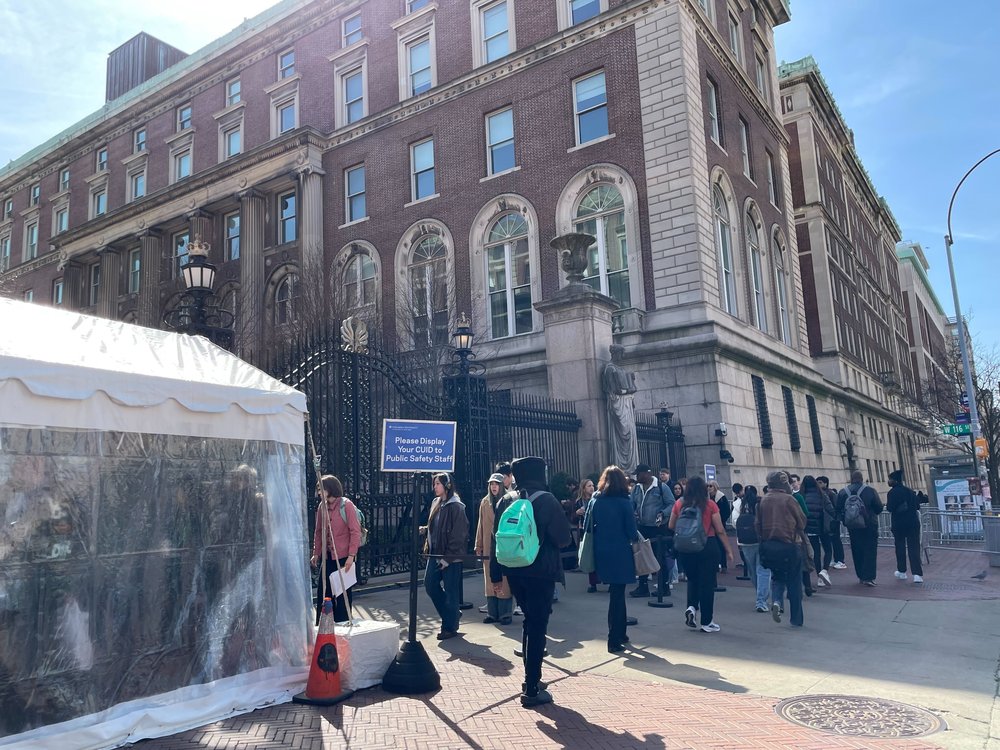Columbia lays off 180 staff amid ongoing tussle over federal research funding
May 6, 2025, 2 p.m.
The job losses come as the Trump administration seeks to exert greater influence over higher education.

Columbia University is cutting about 180 staff members whose salaries were tied to federal research grants eliminated by the Trump administration, university officials said in a campuswide email Tuesday.
“In some cases, schools and departments are winding down activity but remain prepared to re-establish capabilities if support is restored,” Columbia's acting President Claire Shipman and other university officials wrote in the email, which was reviewed by Gothamist.
Some researchers will be able to apply for temporary internal funding from Columbia through a newly established Research Stabilization Fund, the letter added.
The staffing cuts are part of the ongoing fallout at the university since it became the first academic institution targeted by the Trump administration in its effort to exert greater influence and control over higher education.
Columbia has sought to negotiate with the administration over demands related to academic offerings and student discipline in order to recoup federal funding that was revoked. But Columbia has faced criticisms from some faculty and students who say it should not bend so easily.
The Trump administration said in early March it was revoking $400 million in funding to Columbia because the university had not done enough to protect Jewish students from antisemitism. The university was the site of intense campus protests since Hamas’ attack on Israel on Oct. 7, 2023, and the war that followed. Much of the funding that was revoked was tied to medical research at the university.
The Trump administration has also separately canceled research grants at Columbia and other institutions across the country that it says no longer align with its priorities. These include grants that prioritize researchers from diverse backgrounds or focus on specific populations such as the LGBTQ+ community.
Overall, more than 300 multiyear research awards at Columbia have been partly or wholly canceled in recent months, according to Shipman’s email. The 180 staff who are either being fired or notified that their contracts won’t be renewed represent about 20% of the people who are funded in some way by the affected grants.
In March, Columbia agreed to comply with most of the Trump administration’s conditions for restoring the funding federal officials revoked, alleging the school allowed antisemitism to fester. In a memo, the university said it would conduct a review of academic offerings in Middle East studies and other departments, hire special officers who can remove people from campus and enforce stricter oversight of student groups, among other measures.
U.S. Education Secretary Linda McMahon later said the university was “on the right track” to have the funding restored.
Columbia’s discussions with the federal government are ongoing, according to Tuesday’s letter, but in the meantime university leaders said they are preparing for “every eventuality” and seeking to reduce spending.
But Columbia has also come under fire from some students and faculty who accuse it of capitulating to the Trump administration too easily. Harvard has taken a different approach and refused to comply with the Trump administration’s demands — but was informed this week that it would no longer qualify for federal research grants.
Last week, faculty from a range of schools and departments at Columbia held a 25-hour demonstration during which people spoke continuously, calling on the university to protect and supplement research funding, but also to stand up for academic freedom and protect students and scholars from federal attacks, among other demands.
Melanie Wall, a professor of biostatistics in the Department of Psychiatry at Columbia University Irving Medical Center, is among the faculty organizing under the banner CUIMC Stands Up.
Wall said she wanted Columbia to try to recoup lost research funding from the Trump administration — but not at the cost of the school’s integrity.
“It’s not meant to be a fight between people who want to protest wars that this country is supporting versus people wanting to be able to continue to do science,” Wall said.
Andrew Little, president of UAW Local 4100, which represents postdoctoral researchers at Columbia and other institutions, said last week that the union was asking the university to commit to providing “bridge funding” to researchers who were paid through terminated grants until they can establish another funding source.
Columbia medical school freezes hiring and other spending amid threat of federal cuts Judge orders release of Columbia student protest leader Mohsen Mahdawi Who is Columbia’s Mohsen Mahdawi? Not the threat the US says, associates say. 'Everyone is scared': Columbia reels as students feud over Israel-Hamas war